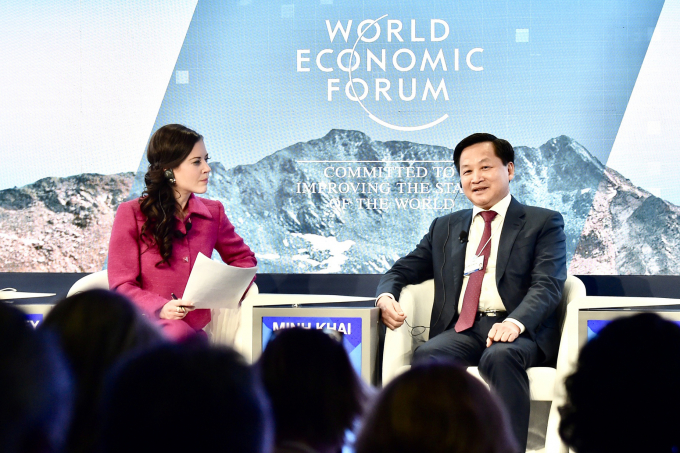November 27, 2025 | 21:35 GMT +7
November 27, 2025 | 21:35 GMT +7
Hotline: 0913.378.918
November 27, 2025 | 21:35 GMT +7
Hotline: 0913.378.918

Deputy Prime Minister Le Minh Khai delivers a speech at the opening session of the World Economic Forum's panel on “Averting a Global Food Crisis”.
The 52nd World Economic Forum (WEF)’s annual meeting under the theme “History at a Turning Point: Government Policies and Business Strategies” is held in Davos, Switzerland between May 23 and 26.
The panel session “Averting a Global Food Crisis” featured the attendance of Tanzania's Vice President Isdor Mpango, Vietnam’s Deputy Prime Minister Le Minh Khai, CEO of the Swiss agriculture company Syngenta, J Erik Fyrwald, and World Food Programme Executive Director David Beasley among others.
Deputy Prime Minister Le Minh Khai stressed that the “dual” crisis generated by the COVID-19 pandemic and geopolitical intentions have caused unprecedented impacts on the supply, prices, and food supply chain on a global scale.
“Vietnam possesses strength in food, we have recently become an important contributor to the global food security”, Mr. Le Minh Khai emphasized, adding five proposals regarding this issue.
First, it needs a holistic, multidimensional, multi-objective, long-term approach toward a self-reliant, inclusive and sustainable food system.
“In the coming time, we have to provide humanitarian support for some countries which are at the risks of food shortage, recovering global food supply system as well as addressing trade hurdles in the food supply”, the Deputy Prime Minister suggested.
In the long run, he believed that it is essential to transform into an agro-ecosystem that is green, sustainable, low emission, climate change adaptive, and environmentally friendly.
Second, international cooperation needs to be boosted to increase the role of multilateral organizations in addressing global food security, including ensuring the thorough food supply chain, eliminating trade barriers in foods, providing financial support for developing countries, promoting the model of tripartite cooperation that Vietnam has effectively deployed with African and Latin American countries.
The third proposal of the Deputy Prime Minister remarked the solutions regarding global food security must ensure the social inclusion to uphold the whole population approach and people must be put at the center, the ultimate goal of any food security policies. Especially, it needs to ensure the transformation of food production which is sustainable, equitable, and takes into account the interests of vulnerable and disadvantaged groups.
Next, Mr. Le Minh Khai proposed to build up an agro-ecosystem with the participation of all stakeholders.
“In Vietnam, we follow policies of linking four stakeholders including the State, entrepreneurs, researchers, and farmers to ensure food supply, sustainable production as well as addressing the interests and responsibility of each stakeholder in harmony”, the Deputy Prime Minister noted.
Fifth, he considered that it is essential to renew the mindset, to create all conditions to promote the development of agriculture and food production industry, especially the adoption of the Fourth Industrial Revolution and linking renovation networks among others.
As an agricultural country, Vietnam called on the support of countries, international organizations, and enterprises in WEF to build a food innovation hub of Southeast Asia in Vietnam.
He also shared the directions of Vietnam to transform into a low-carbon, green, eco, and sustainable agriculture from three core pillars namely eco-agriculture, modern countryside, and smart farmers.
However, Vietnam is facing several challenges as the impacts of climate change, the rise of sea level, and salinity intrusion in the Mekong Delta - one of the nation’s and world’s food production centers.
Thereby, Deputy Prime Minister Le Minh Khai called on organizations, international organizations, and scientists to work together with Vietnam to come up with solutions to tackle climate change, build sustainable agriculture, meeting the food demands of Vietnam and the world.
Translated by Linh Linh

(VAN) On November 27, in the meeting with Minister Tran Duc Thang, Mayor Yin Yong shared Beijing’s experience to improve environment and air quality.

(VAN) After 30 years, both sides identified strategic areas of cooperation: sustainable production, increasing coffee value and training for farmers.
/2025/11/27/4910-4-164708_294.jpg)
(VAN) On the afternoon of November 27 in Beijing, Minister of Agriculture and Environment Tran Duc Thang held a working session with several major Chinese enterprises operating in the agriculture and environment sector.

(VAN) The Department of Animal Health issued a provisional guideline requesting local authorities to increase surveillance, collect samples for testing, and conduct epidemiological investigations according to the established procedure.

(VAN) The United Nations recommends that Vietnam utilize data and artificial intelligence to enhance early disaster warnings and reduce GDP losses by 3.2% in the context of climate change.

(VAN) On the morning of November 27 in Beijing, Minister Tran Duc Thang and the Deputy Commissioner General of the General Administration of Customs of China signed a protocol on fresh jackfruit exports.

(VAN) As floodwaters recede, a vast network of irrigation works across eastern Gia Lai is emerging in a state of severe disrepair, with extensive damage demanding urgent restoration ahead of the 2025-2026 winter-spring cropping season.